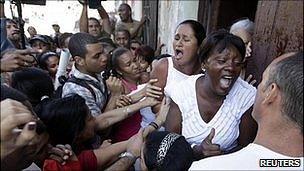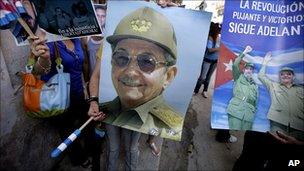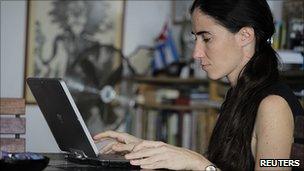Dissidents' release draws line under Cuba crackdown
- Published

Members of the Ladies in White movement have clashed with pro-government supporters
The Cuban government has freed the last two political prisoners detained during a major crackdown on opposition activists in 2003.
Felix Navarro, 57, was a teacher and political activist; 40-year-old Jose Ferrer a fisherman and member of one of the opposition movements. They were serving 25-year jail terms and considered prisoners of conscience by Amnesty International.
Both returned home early Wednesday morning.
"My dad is in great spirits, very upbeat, very happy, and prepared to pick up where he left off in 2003," his daughter Sayli Navarro said.
Their release means that all of the 75 leading intellectuals, opposition figures and activists detained during what became known as Cuba's "Black Spring" are now out of jail.
At the time there was widespread international condemnation at the mass arrests and long prison terms, with the European Union suspending all its co-operation programmes.
Some of the prisoners were later released on health grounds.
But the real breakthrough came in July last year, with an unprecedented, ground-breaking deal brokered by the Roman Catholic Church in which Cuba's President Raul Castro agreed to free the remaining 52.
Within months, the majority had left with their extended families for Spain. But the process stalled when a dozen of the men refused to go into exile, demanding to be allowed to return to their homes in Cuba.
Now, at last, all 12 men are back with their families.
Some like Felix Navarro have indicated they intend to maintain their roles as critics of the government.
Angel Moya is another dissident who opted to remain in Cuba.
His wife, Berta Soler, is one of the leaders of the Ladies in White movement. These are wives and mothers of the 75 who campaigned for their release, marching peacefully every Sunday since their arrest hoping to keep the issue in the public eye.
"I am very content and nervous at the same time," Berta Soler said after her husband's release, adding that the protests would continue despite the fact that all their loved ones are now out of jail.
"It is very important that we fight, not only for the freedom of the 75, but also for other prisoners."
Just how many other political prisoners there are is hard to gauge.
The Cuban government has gone beyond its original pledge and allowed at least 60 other prisoners to go to Spain. Eleven more are due to leave shortly, including the last man listed as a Prisoner of Conscience by Amnesty International.
The majority, though, were jailed for what human rights groups describe as violent but politically motivated crimes such as attempting to hijack boats to flee to the US.
Elizardo Sanchez, head of the illegal but tolerated Cuban Human Rights Commission, estimates that there are about 50 such prisoners still behind bars. His list, though, includes those jailed for murder, bombings, and other serious crimes who are not generally recognised as political prisoners.
So why this change of heart by the government?
The political prisoner issue had become an unwelcome distraction for President Raul Castro as he prepared to push through some tough economic reforms, including cutting jobs and reducing subsidies.
The death in jail last year of the dissident hunger striker Orlando Zapata Tamayo refocused world attention on human rights in Cuba. The issue remained in the headlines after another dissident, Guillermo Farinas, began his own prolonged hunger strike.

Supporters of President Castro have held protests outside the homes of dissidents
It also emboldened the small and often divided opposition groups.
By turning to the Roman Catholic Church, President Castro was able to broker a "Cuban" solution without appearing to bow to outside pressure. The head of the Church here is Cuban-born Cardinal Jaime Ortega.
It is also an indication of the growing influence of the Church, which today is the only significant non-state grass roots organisation on this communist run island.
The US has welcomed the releases while criticising Havana's attempt to ship most of its high-profile critics into exile abroad.
The EU is due to consider in the coming months whether to fully normalise relations with Cuba.
Opposition in Cuba
Cuba remains a one party state and despite the releases, the authorities continue to harass opposition groups even though they appear to have little impact amongst ordinary Cubans.
Earlier this month saw the 8th anniversary of the 2003 crackdown. The remaining Ladies in White and some of the released prisoners met at the house of one of the organisers intending to hold a short march.
Instead the house was besieged by several hundred pro-government supporters chanting abuse and forcing them to stay indoors.
The Cuban government denies that it holds political prisoners and considers dissidents as mercenaries financed by the US in order to destabilise the government.

Blogger Yoani Sanchez is leading a new generation of dissident voices in Cuba
It likes to quote one of the confidential US diplomatic cables released by Wilikeaks allegedly written by the most senior US diplomat on the island, Jonathan Farrar. In it he complains of the dissident movement's preoccupation with money and obtaining resources from the US.
Perhaps more damning is Mr Farrar's assessment of the effectiveness of the opposition in Cuba, calling its leadership old, largely unknown and badly divided.
"We see very little evidence that the mainline dissident organisations have much resonance among ordinary Cubans," he wrote in his cable to Washington.
If there is one group which is starting to concern the communist authorities it is the small band of Cuban bloggers who tend to be young and with no prior political affiliation.
Blogs like Yoani Sanchez's Generation Y have won international acclaim and countless awards, yet she has never been allowed to travel abroad to collect them.
A recently leaked video of an interior ministry meeting shows officials being briefed on how the US is now allegedly encouraging dissent through social media such as Facebook and Twitter with the goal of toppling the government.
Cuba may have one of the lowest levels of internet access and mobile phone ownership in the Americas, but social media, it appears, is slowly starting to have an impact.
- Published23 March 2011
- Published12 March 2011
- Published19 February 2011